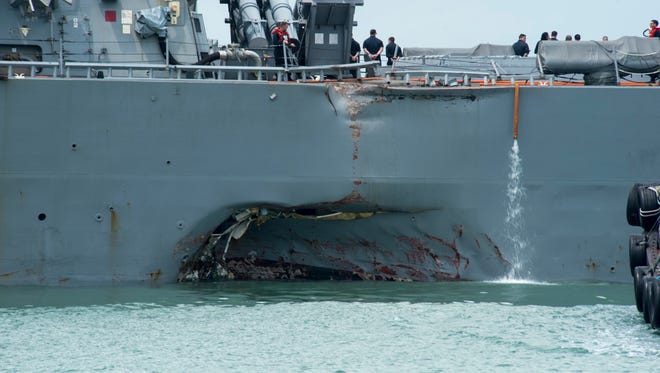USS McCain collision shouldn't have happened. We must find out why it did.
This is the fourth major maritime incident this year for the U.S. Navy. Something needs to change.

Yesterday, the USS John S. McCain reported a collision with a tanker, the Alnic MC. This marks the second collision at sea in the U.S. Navy’s 7th fleet in two months. It marks the fourth major mishap at sea in 2017.
The thing is, a collision at sea should never happen aboard a US Navy warship. We have processes in place to prevent them. In the Combat Information Center, there are no windows to look for nearby obstacles, but there are several sailors, both enlisted and commissioned officers, looking at RADAR screens and other military sensors. On the bridge of a destroyer, there are at least five watchstanders, including no fewer than two junior officers, all tasked with making sure the ship gets to where it needs to be and doesn’t hit anything. Finally, there are lookouts, one forward and one aft (the back end of the ship) sitting outside looking for other ships. Given all of that, we know that when a collision at sea occurs aboard a US Navy warship that several processes have failed.
More:Penn State president: 'Self-governance' for fraternities and sororities needs to end
More:Of course, Trumpian hysteria and an eclipse come together: Welcome to our crazy years
Generally, when a collision happens, the commanding officer is relieved, along with varying degrees of punishment for officers and senior enlisted members deemed responsible.
But this, in my view, is a bigger issue. Both the USS Fitzgerald and the USS John S. McCain are under the command of Destroyer Squadron 15, based out of Yokosuka, Japan. After this incident, 25% of the total force of Destroyer Squadron 15 is now indefinitely out of commission; during a period of heightened tensions between North Korea and America and her allies. The senseless deaths of so many sailors, indefinite loss of two $2 billion national assets, and nearly a third of sea based ballistic missile defense in the region in a span of two months presents a significant blow to American military strength in the region.
Firing the commanding officer of a single ship does not begin to correct the years of under-funding ship maintenance, inadequately prioritizing and funding effective shore based watchstander training across the entire Navy, and over promising capability to the higher echelons of command. These ships currently spend an average of 225 days underway a year. If a city had fire engines at fires 62% of the time, with so little time dedicated to maintenance, training, and upkeep, we’d have a lot more buildings burning down. Responsibility lies at the feet of the leaders and the leaders here are the Commander of Task Force 70 and Destroyer Squadron 15.
It’s important to note that it’s too early to tell what happened and why, and (as of this writing) the U.S. Navy and Singaporean and Malaysian counterparts are still searching for 10 sailors. As we and our allies work to locate these brave men and/or women in uniform, our thoughts and prayers are with the families.
More:Solar eclipses have always been weird. Don't let this one weird you out.
POLICING THE USA: A look at race, justice, media
I served in the Navy, aboard two warships, and deployed to that part of the world. That could have been me. I know that collisions’ at sea are one of the biggest concerns facing the US Navy. That’s why there are several sailors standing watch at any given time.
Therefore, it is time for the Navy to begin a deep-dive investigation into these issues. Issues which are no secret to the admirals serving in forward deployed jobs. Destroyer Squadron 15, Task Force 70, and procedures for all Forward Deployed Naval Forces must be looked at and considered for immediate modification. There must be a better way and it speaks to the Chief of Naval Operations dedication to his team that he ordered a pause to all operations today.
But the pause is not enough. Congress must also intervene and conduct a full investigation to ensure we are able to quickly and fully rebuild our naval forces in the Pacific region. Members of the House and Senate Armed Services Committees must join Congressman Ruben Gallego in calling for investigations into these mishaps and how we might modify our military procedures and protocols to prevent further senseless loss of life.
Earlier, I mentioned that our thoughts and prayers are with the families. Thoughts and prayers don’t save lives though, and both our Navy and Congress owes it to our men and women in uniform, and their families, to investigate these issues. Our regional stability, and the lives of our men and women in uniform, depend on it.
Shawn VanDiver is a US Navy veteran and San Diego Chapter Director for the Truman National Security Project. Follow him on Twitter: @shawnjvandiver.
You can read diverse opinions from our Board of Contributors and other writers on the Opinion front page, on Twitter @USATOpinion and in our daily Opinion newsletter. To respond to a column, submit a comment to letters@usatoday.com.